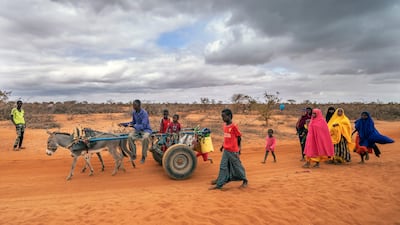Divisions between European Union members hindered diplomats’ efforts to agree on a ninth package of sanctions against Russia when EU leaders met in Brussels on Thursday.
“I understand that on the sanctions package there are concerns expressed not necessarily by Hungary, but by a few member states and I think that there is still some work that’s needed,” said European Council President Charles Michel as he arrived at the last EU leaders’ summit of the year.
Mr Michel told reporters that he expected European diplomats to keep working in parallel to the summit on Thursday “to make sure that today we take a decision”.
“I think this is possible, but we will need to work in the following hours,” he said.
New sanctions on Moscow are being held up by disagreements over whether Brussels should make it easier for Russian fertiliser exports to pass through European ports, even in the case when the fertiliser companies are owned by blacklisted oligarchs.
EU sanctions do not target Russian fertiliser and grain, but they reportedly discourage shipping companies from transporting all Russian cargo.
A senior EU diplomat said that two countries, which he did not name, opposed relaxing the rules, saying that “no unnecessary euro should go to any Russian oligarch.”.
The diplomat said that UN Secretary General Antonio Guterres had asked the EU to “ease up a little bit” on fertilisers to not endanger food security in Africa.
“African countries ― they really need Russian fertiliser amongst others to act on their food security and prevent famine,” the diplomat said.
Relaxing sanctions would entail the European Commission allowing countries to issue derogations to their port authorities, not de-listing sanctioned Russian oligarchs, he said.
But this is not an easy decision to take, because it would make the EU look as if it is to blame for the negative consequences of Russia’s invasion of Ukraine on world food security.
“The fertiliser that they need not being there is a consequence of a Russian action, not an EU action,” he said.
Some member states want the World Food Programme involved on authorisation for exports of fertilisers to countries that need it.
The Dutch port of Rotterdam, the largest in Europe, currently does not permit the transit of Russian fertilisers to third countries even if it is for the WFP.
One EU diplomat told Reuters that Poland and the Baltic states are telling other countries that they are deluding themselves if they think a relaxation on Russian fertilisers is not going to be abused as a loophole for oligarchs.
Mr Guterrez in October said that global food security was at risk.
“If food and fertilisers do not reach global markets now, farmers will not have fertilisers at the right time and at a price they can afford as the planting season begins, endangering crops in all regions of the world in 2023 and 2024, with dramatic effect on food production and food prices worldwide,” he said.
The Financial Times reported last week that several EU countries including Germany, France and the Netherlands sent a position paper to the European Commission, asking it to make a clearer exemption for Russian fertiliser and grain exports.
The paper claimed that shipments are sometimes held at European ports for longer than is necessary.
Senegalese president and chairman of the African Union, Macky Sall, in June told Russian President Vladimir Putin during a visit to Moscow that the war in Ukraine and western sanctions had made food shortages worse.
African countries imported 44 per cent of their wheat from Russia and Ukraine between 2018 and 2020, according to UN figures.


